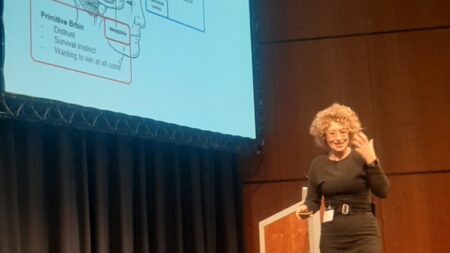
Starting her career working in deprived communities, Mandy focussed on children and their families, providing bio-psycho-social education and support. She then moved into the private sector, working with organisations experiencing traumatic events, such as Sept 11th and the July 7th bombings. Mandy now works alongside leaders in a range of industries including HMG Home Office, national charities, construction, renewable gas, and a premier football club.
Specialising in improving the psychological health of employees, managers, and senior leaders within all areas of the workforce, Mandy delivered over 350 webinars on a wide variety of psychological topics during the covid lockdown.
Reflecting on her talk at the TSA conference, Mandy said: “As a psychologist, passionately interested in mental health, resilience, and all things well-being, it was an exciting privilege to talk about good mental health and healthy habits at the Tank Storage Conference this year.
“I thought it might be a bit of a tough audience, as I came to last year’s conference and was last on the agenda and only a handful of really interested people (and a few friends) remained attentive. However, at this year’s event there were so many friendly faces, all positive and enthusiastic, which certainly lowered my anxiety and increased my endorphins.”
Talking about mental health is challenging
I am under no illusion that talking about mental health and psychology to a mostly male, technical, process-focused audience is challenging. It’s not always the first item on the agenda of ‘really important’ things in life – that is, of course, unless you, or your loved ones, have had anxiety, depression, or other equally debilitating conditions, that reduce not only your performance, but your whole personality and drive for life.
Since the pandemic, we have seen an increase in the number of people who are struggling with their mental health. This is due to a whole variety of reasons, ranging from isolation, financial worries, health worries, relationship conflicts and worries about our children, many of whom have struggled with schooling and socialising post-pandemic. Anxiety and depression are the conditions that have affected us all the most, with approximately 1 in 6 adults in the UK struggling with symptoms.
Many people are not getting the help they need and, as we know, our NHS is overwhelmed with mental health referrals, but this is where our organisations can really play our part.
We should all proactively engage in promoting healthy habits
Most of the organisations we work for have resources and professionals available to offer support, assistance, and counselling that could really help reduce symptoms of anxiety and depression. And yet, we don’t use them.
Most Employee Assistance Programmes have about a 5% take-up rate from employees, but there are about 20% of us struggling with mental health at any one time. Our leaders and managers must act as informed role-models in that respect, understanding how the servicers work, and ensuring that every opportunity is taken to describe the importance of getting help and support at an early stage when people are struggling.
Creative use of posters, key rings, re-usable cups with logos and phone numbers could help to provide regular messages about the importance of maintaining good mental health and proactively engaging in the healthy habits that I promoted during the conference talk.
Why is this so important in our industry – are we any different to other industries?
The answer can be easily explained through the lens of safety. Any of us involved in safety (and that should be all of us), know that, when your concentration is impaired, your thinking is foggy, and you are distracted; the decisions you make about your own safety and the safety of others is compromised.
In addition, safe health and safety practices rely on us to be motivated about the care of ourselves, the care of others and the care of our site and equipment. When you feel low, unmotivated, sad or worried, the extra emotional energy it takes to care and to follow all the workplace procedures is enormous, and sometimes we just can’t find that energy.
Good mental health matters
We already know that approximately 60% of us are not getting our 7-9 hours of sleep, and, according to a recent study, tiredness is the number one health issue impacting productivity. This is why good mental health matters – it saves lives. We need all our workforce to understand that good mental health and safe workplace practices are inextricably linked.
The challenge of this season
This time of year has particular importance for those of us who are prone to depression, and leaders can really play their part in helping to educate and support the workplace.
Seasonal Affective Disorder (SAD) is a type of depression that usually occurs with the changing seasons, and often when the winter months arrive with a drop in temperature and reduced hours of sunlight.
Drivers, particularly, may get up and leave the house in the dark and return in the dark, sometimes not getting any hours of natural sunlight during the day. Sunlight is a key factor in producing serotonin, a hormone affecting sleep, mood, and appetite. Reduced sunlight can lead to reduced serotonin which can lead to depression. Some of the common symptoms of SAD include:
• Lack of energy
• Difficulty concentrating
• Not wanting to be around people
• Feeling sad, low, tearful, guilty
• Not enjoying things that usually give you pleasure and joy
• Feeling anxious, agitated
• Change in sleeping habits, either too much or too little
• Change in eating habits, again either too much or too little
Challenge the stigma
If you are experiencing these symptoms, it is important that you reach out and ask for help from a health professional. There are many things that our organisations can do to help people who experience SAD, for example providing specialist lights, altering shifts, referring to OH and counselling professionals.
However, the stigma of asking for help, and the ‘self-stigma’, particularly for men, feeling that we should be able to cope with everything by ourselves, often prevents us from reaching out.
This is where the education campaigns, the posters, the articles, the regular reminders, and the role-modelling from leaders can all help to challenge the stigma and encourage each and every one of us to get the help we all need, when we need it.
If you feel that you need help or support, then do get in touch with:
Mind – 0300 123 3393
Samaritans – 116 123
CALM – 0800 58 58 58
Fuel Oil News will continue to consider mental health and well-being next year. If you or your business has mental health initiatives that you would like to share, then please contact claudia@andpublishing.co.uk
